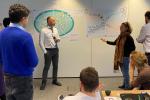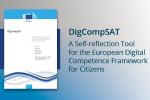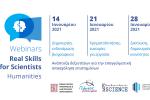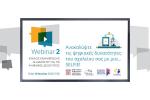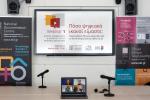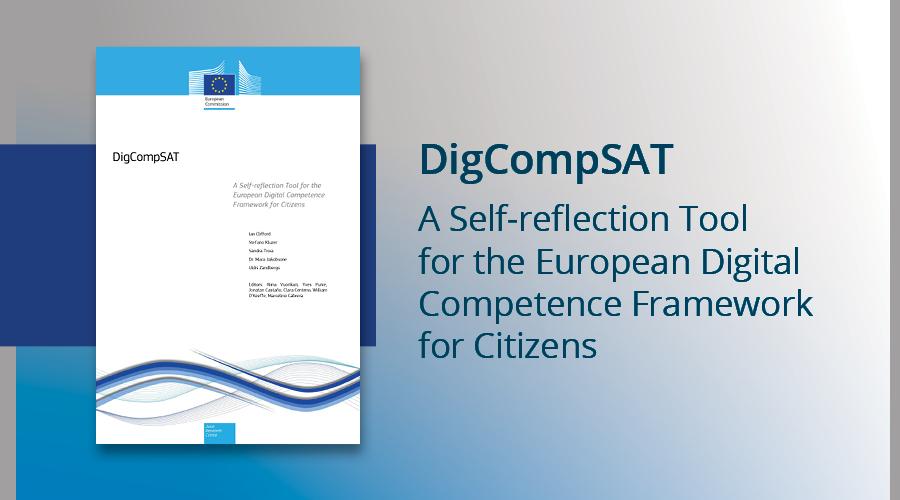
The pilot implementation of a practical Digital Competence Self-Assessment Tool, DigCompSat (Digital Competence Self-Assessment Tool), is presented in a report published in late December 2020 by the European Commission's Joint Research Centre (JRC). The tool is based on the European Digital Competence Framework for Citizens (DigComp for short) which provides a comprehensive approach to the digital competence of the general population (16 to 65 years old) using the set of DigComp 2.1 competences corresponding to levels 1 to 6 (basic, intermediate and advanced).
DigCompSat was designed to measure digital competence based on the three fundamental elements (knowledge, skills and attitudes) for each of DigComp 5 key dimensions: Basic use of information and data, Communication and collaboration, Digital content creation, Security, Problem-solving. The tool allows citizens to reflect on the current level of their digital competence to get a reliable picture of if and where it needs improving.
DigCompSat was piloted in three European countries, representing the three categories of countries as defined by the percentage of citizens with little or no skills based on the 2020 Digital Skills Index (DSI): Ireland, which is above European average, Spain close to the average and Latvia below the average.
The pilot implementation of the tool in these countries provided reliable feedback on citizens' digital competence in different groups of the population, in terms of age, gender, educational level, and digital skills. The DigComp tool has shown good psychometric properties, including the validity and internal consistency of the items. Additionally, it is an easy-to-use tool, as the clarity and brevity of the 82 questions included allowed participants to complete it in less than 30 minutes, on average.
DigCompSat proved to be effective for three key functions tested: measuring participants digital competence based on their self-reflection questionnaire responses, highlighting any gaps they have in their digital competence and raising awareness.
The Joint Research Centre report describes the research methodology used for the creation and pilot implementation of the tool. The report's appendices present in detail the statistical analysis, the various stages of development of the questionnaire, and its final in-depth format. Many experts and citizens took part in a series of consultations and focus groups, contributing to both the initial design and the pilot implementation and adaptation of the tool.
The Joint Research Centre has begun reviewing the DigComp framework and has published an open call to those who want to join a community of practitioners to contribute to the whole process actively. The National Documentation Centre (EKT) has been invited and is participating in the DigComp update process, contributing to the dissemination of results in Greece.
Using DigComp in Greece
The Ministry of Digital Governance has long recognised the importance of cultivating citizens' digital skills, as the development of digital skills is at the core of the country's digital transformation. The country ranks 23rd out of 27 European Union member states in the Digital Skills Index.

Source: Eurostat (2019) – Percentage of individuals, by digital skills level
One of the actions of the Ministry of Digital Governance is the development of the Digital Citizens Academy, which aims to gather educational content that improves the digital skills of citizens. The Academy, among other things, includes a well-designed and easy-to-use tool for the self-assessment of Greek citizens' digital competence based on the European DigComp Framework, version 2.1.
Like DigCompSat, the Digital Academy self-assessment tool addresses three key competency levels (basic, intermediate and advanced) and includes 63 self-reflection questions. One of the Digital Academy innovations is that it recognises it is not enough simply to offer a modern and easy-to-use self-assessment tool. Therefore, it offers citizens personalised course proposals based on their self-assessment result, which they can attend if they want to improve their digital competence.
To date, the 214 available courses offered by 32 providers correspond to 1,800+ learning hours and are organised into 30 modules, while they are enriched continuously through an open call for additional content.
EKT, a Ministry of Digital Governance body, plays a coordinating role in the 'National Alliance for Digital Skills and Jobs'. In collaboration with reputable bodies and ongoing dialogue with the educational, research and academic community, EKT develops infrastructure and services, promoting knowledge, research and innovation in the digital space. It is also the coordinator of the 'Knowledge and Partnership Bridges' initiative for the networking and collaboration of Greek scientists and researchers worldwide.
Μάθετε Περισσότερα
- DigCompSat Report
- 2020 Digital Skills Index
- The Digital Competence Framework 2.0
- The European Digital Competence Framework for Citizens
- The European Framework for the Digital Competence of Educators
- The European Framework for Digitally-Competent Educational Organisations
- SELFIE for schools
- SELFIE for teachers
- National Digital Academy
- Ministry of Digital Governance
- Joint Research Centre, JRC
- Article in GR ~ Digital Skills | Innovation, Research & Digital Economy | Ekt Magazine ~ Issue119









